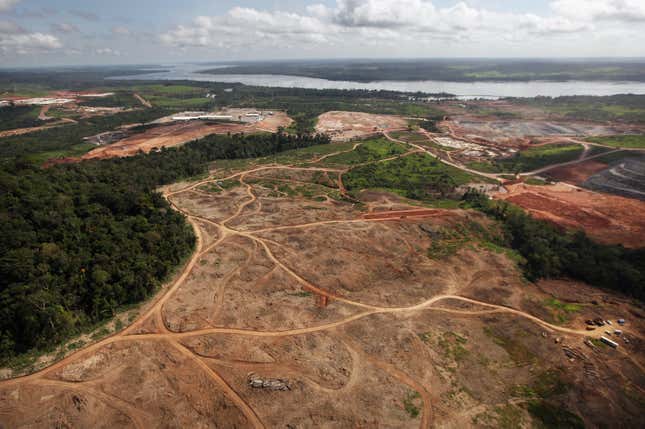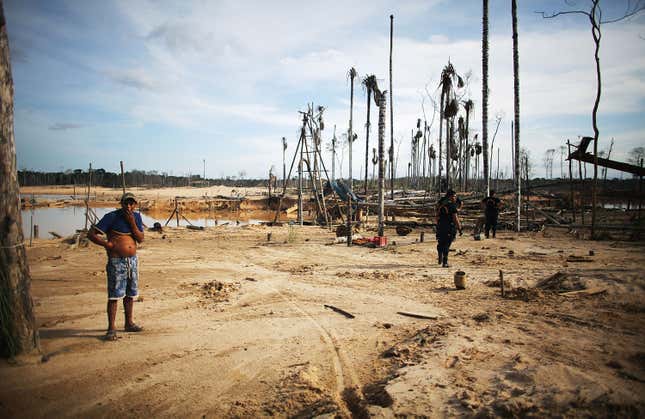
Luiz Inácio Lula de Silva’s narrow victory over incumbent Jair Bolsonaro in Brazil’s recent presidential election has reinvigorated the Latin American left. Despite recent setbacks in Peru and Argentina, left-wing governments in the region rule at the highest rate in over two decades, in what has come to be known as the second “pink tide.”
A resurgence of the far-left surge of the late 1990s, newly-elected leaders across the region have prioritized environmental issues, blaming neoliberal policies for fueling the climate crisis and contributing to worsening inequality.
After victories in the five largest economies in Latin America, the left-wing governments have the chance to enact meaningful forestry, agricultural, and energy reforms over the course of next year and beyond. Here’s a look at their plans, and the challenges they face.
Charted: Latin America’s pink tide
Seeing the Amazon forest for the trees
Since the onset of his presidential campaign, Lula has stressed the importance of reversing deforestation in the Amazon rainforest, pledging to undo the environmental destruction seen under his predecessor, Jair Bolsonaro.
Lula was largely successful at turning the tide of deforestation during his previous term as president, cracking down on illegal logging and creating new methods to track forest loss. In 2004, the year after he took office, the Amazon lost 7 million acres of trees. By 2012, a year after the end of his tenure, the annual losses were down to 1.1 million acres.
That number rose precipitously after the new Bolsonaro administration weakened a number of laws regulating loggers and agricultural businesses. During his first three years in office, the Amazon lost 8.4 million acres, a 52% increase over the previous three-year period. As the world’s largest carbon sink, preserving and repopulating rainforests like the Amazon is essential to achieving the climate goals of the Paris agreement.
Lula has argued that Brazil can remain a major agricultural producer without needing to clear another acre of rainforest, pledging to eventually reach zero deforestation in the Amazon. To get there, Lula will have to work with a hostile congress and weakened environmental institutions.
Mexico’s saying no to GMO
In 2021, Mexico’s president Andres Manuel Lopez Obrador (known as AMLO) announced plans to phase out imports of genetically-modified corn by 2024, excluding production meant for livestock. AMLO campaigned on a promise to ban genetically-modified crops in Mexico, deeming them detrimental to traditional agricultural practices and possibly hazardous to human health. He has stated that the ban on corn is a first step towards promoting organic, regenerative agriculture in Mexico.
An unprecedented decision in the Americas, US farmers have repeatedly claimed that this trade restriction breaks the USMCA, the free trade agreement between Canada, Mexico, and the US. While open to negotiations, the Mexican government has stated its intention to protect itself in a possible trade dispute with the US and Canada, an already tenuous relationship after a recent disagreement over Mexico’s nationalized energy sources.
AMLO has also pushed for a ban on the common herbicide glysophate, a key ingredient in Monsanto’s popular weedkiller, that has been linked to cancer. Colombia, where glysophate has been sprayed over coca plantations as part of the country’s war on drugs, imposed a ban on the substance in 2015, a decision that turned into a long court battle. The country’s newly elected leftist president Gustavo Petro plans to expand this ban as he rethinks Colombia’s approach to the war on drugs, including proposals to decriminalize cocaine and end all aerial spraying of coco plants.

Canary in the metal mines
Pedro Castillo’s ousting earlier this month put an abrupt end to his term as Peru’s first indigenous president, and spurred a series of fervent protests in the rural, poor communities that made up much of his support. Castillo’s supporters accuse multinational corporations and establishment politicians of sabotaging the socialist leader, while his opponents say he was a destabilizing figure and a threat to democracy.
The demonstrations have been largely concentrated in mining communities around the country, where poor, mostly indigenous workers are employed by foreign companies for low wages. Castillo promised aggressive mining reforms during his campaign and supported a number of strikes and blockades during his time in office. One of the world’s largest exporters of copper and gold, Peru is also one of the poorest and most unequal countries in Latin America.
Next door in Chile, the government of left-wing president Gabriel Boric campaigned on an aggressive overhaul to the tax code focused on foreign mining companies. Recently, the Chilean government floated a 1% increase on copper mining royalties for any company that produces more than 50,000 tons per year, and a 4% increase for companies with production over 200,000 tons, with all new revenue redirected to newly-enacted social welfare programs.
In response, a number of mining companies have threatened to pull out their investments, while Boric has repeatedly vowed to pass aggressive environmental regulations in the industry and create a state-owned lithium company.
Venezuela only talks the talk
President Nicolas Maduro of Venezuela struck a forceful tone at the COP27 conference in November, denouncing the extraction of natural resources in service of unrestrained capitalism as the root cause of climate change. “The cause [of climate change] is the dream of seeking to find happiness in accumulating possessions,” Maduro said, quoting his political mentor and predecessor Hugo Chávez. “People think they have a right to grab and own and destroy anything that stands in their way to accumulating capital.”
Missing from the speech? Any mention of Venezuela’s current oil industry, which produces more than 2 million barrels of oil each day. Once the richest economy in South America, the petrostate is still among the largest exporters of oil in the world, even after a series of strict sanctions on the industry were imposed by the US and other Western nations in recent years.
Additionally, Venezuela has the fastest-growing rate of deforestation in Latin America. This is mainly due to Maduro’s 2016 decision to open up the massive Orinoco region bordering the Brazilian Amazon for the mining of gold and other valuable minerals. Reports from the region include gang warfare, heavily polluted rivers, and a largely avoidable malaria epidemic.
Venezuela’s poor environmental record notwithstanding, the US has recently opened up to reconsider part of the sanctions imposed on the country under the Trump administration in a bid to compensate for the sanctions-hit Russian crude. As Venezuela faces a series of political, economic, and social challenges, it looks like environmental progress will be put on the back burner.
Related Stories:
🪓 Brazil is failing to stop illegal logging of the Amazon
💊 In Colombia, women’s health paid the price of misguided drug control policies
🛢️ The Tienditas bridge serves as a powerful symbol of improving ties between Venezuela and Colombia



